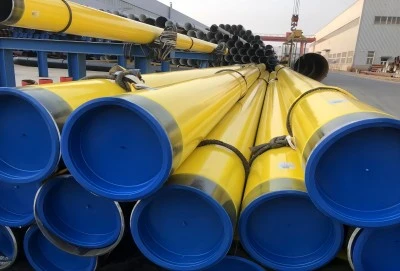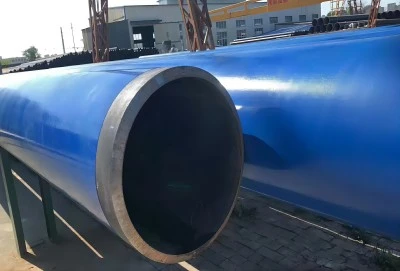The main difference between galvanized and fusion bonded epoxy coated steel pipe lies in their protective coatings and performance characteristics. Galvanized pipes are coated with a layer of zinc, while epoxy coated pipes, particularly fusion bonded epoxy (FBE) coated steel pipes, have a protective layer of thermosetting polymer. FBE coated pipes offer superior corrosion resistance, chemical resistance, and durability in harsh environments, making them ideal for various industrial applications. Galvanized pipes, on the other hand, provide good protection against rust and are more cost-effective for less demanding environments.
|
|
|
Corrosion Resistance: Galvanized vs Epoxy Coated Pipes
When it comes to protecting steel pipes from corrosion, both galvanization and epoxy coating offer unique advantages. Understanding the differences in their corrosion resistance properties is crucial for making informed decisions in various industrial applications.
Longevity of FBE coated pipes in harsh environments
Fusion bonded epoxy (FBE) coated pipes have gained popularity in industries requiring exceptional corrosion protection. These pipes excel in harsh environments, such as those found in oil and gas transportation, offshore platforms, and chemical processing plants. The FBE coating forms a strong bond with the steel substrate, creating a seamless barrier against corrosive elements. This robust protection allows FBE coated pipes to maintain their integrity for extended periods, even when exposed to aggressive chemicals, high temperatures, and abrasive materials.
Zinc protection: How galvanization safeguards steel
Galvanized pipes rely on a zinc coating to protect the underlying steel from corrosion. The zinc layer acts as a sacrificial anode, corroding preferentially to protect the steel. This process, known as cathodic protection, effectively shields the pipe from rust and extends its service life. Galvanized pipes perform well in less aggressive environments and are commonly used in water supply systems, construction, and general industrial applications where moderate corrosion resistance is sufficient.
Chemical resistance comparison: FBE vs galvanized pipes
When it comes to chemical resistance, fusion bonded epoxy coated steel pipes have a clear advantage over galvanized pipes. The epoxy coating provides excellent protection against a wide range of chemicals, including acids, alkalis, and solvents. This makes FBE coated pipes suitable for transporting various substances without compromising the pipe's integrity. Galvanized pipes, while resistant to some chemicals, may not perform as well in highly acidic or alkaline environments. The zinc coating can react with certain chemicals, potentially leading to accelerated corrosion or contamination of the transported material.
Cost-Effectiveness: Comparing Pipe Coating Options
When selecting between galvanized and epoxy coated steel pipes, cost-effectiveness plays a crucial role in decision-making. Let's examine the financial aspects of both options to help you make an informed choice for your project.
Initial investment: Galvanized vs FBE coated steel pipes
Galvanized steel pipes generally have a lower upfront cost compared to fusion bonded epoxy coated steel pipes. The galvanization process is well-established and relatively simple, resulting in more affordable products. On the other hand, FBE coating requires specialized equipment and processes, which contributes to a higher initial investment. However, it's essential to consider that the higher cost of FBE coated pipes often translates to superior performance and longevity, potentially offsetting the initial expense over time.
Long-term savings: Maintenance costs of different coatings
While galvanized pipes may seem more economical initially, they often require more frequent maintenance and replacement in challenging environments. The zinc coating can wear away over time, especially in acidic or highly corrosive conditions, necessitating repairs or replacements. In contrast, FBE coated pipes typically have lower maintenance requirements due to their superior corrosion and chemical resistance. This reduced need for maintenance and repairs can lead to significant long-term savings, particularly in industries where downtime is costly.
ROI analysis: FBE vs galvanized pipes in various industries
The return on investment (ROI) for FBE and galvanized pipes varies depending on the industry and application. In oil and gas, chemical processing, and offshore industries, where pipes are exposed to extreme conditions, fusion bonded epoxy coated steel pipes often provide a higher ROI due to their extended service life and reduced maintenance needs. For less demanding applications, such as residential plumbing or light industrial use, galvanized pipes may offer a better ROI due to their lower initial cost and adequate performance in milder environments. When conducting an ROI analysis, consider factors such as expected lifespan, replacement frequency, and potential costs associated with pipe failure or contamination.
Which Coating to Choose? Industry-Specific Recommendations
Selecting the right pipe coating is crucial for ensuring optimal performance and longevity in various industries. Let's explore industry-specific recommendations to help you make the best choice for your application.
Oil and gas: FBE coated pipes for extreme conditions
In the oil and gas industry, pipes are subjected to harsh environments, high temperatures, and corrosive substances. Fusion bonded epoxy coated steel pipes are the preferred choice for these demanding conditions. The epoxy coating provides excellent protection against both internal and external corrosion, ensuring the integrity of pipelines transporting crude oil, natural gas, and other petroleum products. FBE coated pipes also offer superior resistance to high temperatures and abrasive materials, making them ideal for offshore platforms and deep-sea applications where maintenance is challenging and costly.
Water supply systems: Galvanized vs FBE pipe performance
For water supply systems, both galvanized and fusion bonded epoxy coated steel pipes have their merits. Galvanized pipes have been widely used in water distribution networks due to their cost-effectiveness and adequate corrosion resistance in less aggressive environments. However, FBE coated pipes are gaining popularity in this sector, especially for large-scale projects or areas with corrosive water conditions. FBE coating provides better protection against internal corrosion and scaling, which can affect water quality and flow rates over time. The choice between the two often depends on factors such as water chemistry, system pressure, and long-term maintenance considerations.
Construction sector: Choosing the right pipe coating
In the construction industry, the choice between galvanized and FBE coated pipes depends on the specific application and environmental factors. Galvanized pipes are commonly used in residential and commercial buildings for plumbing and HVAC systems, where they provide adequate protection at a lower cost. However, for structures in coastal areas or industrial zones with higher corrosion risks, FBE coated pipes may be the better option. They offer superior protection against salt spray, industrial pollutants, and other corrosive elements that can rapidly degrade galvanized coatings. Additionally, FBE coated pipes are increasingly used in fire protection systems due to their excellent heat resistance and durability.
In conclusion, the choice between galvanized and epoxy coated steel pipes depends on your specific needs and operating conditions. Galvanized pipes offer cost-effective protection for less demanding environments, while FBE coated pipes provide superior corrosion resistance and longevity in harsh conditions. For industries like oil and gas, chemical processing, and offshore applications, FBE coated pipes are often the preferred choice due to their exceptional performance and long-term cost-effectiveness. However, galvanized pipes remain a viable option for many construction and water supply projects where extreme conditions are not a concern. Carefully consider your project requirements, environmental factors, and long-term maintenance needs when making your decision.
China Fusion Bonded Epoxy Coated Steel Pipes
For high-quality fusion bonded epoxy coated steel pipes, look no further than Hebei Longma Group. With advanced production equipment imported from Germany and independently developed technologies, Longma Group ensures top-notch product quality. Our professional team of over 300 employees, including 60+ technical experts, guarantees innovative solutions and excellent customer service. We boast comprehensive testing facilities, including ultrasonic flaw detectors and industrial X-ray equipment, ensuring product reliability. With fast delivery times as short as for standard thickness pipes and complete certifications including API 5L and ISO 9001, we offer both quality and efficiency. Our competitive pricing is made possible through stable raw material partnerships and an integrated production model. For your steel pipe needs, contact us at info@longma-group.com.














